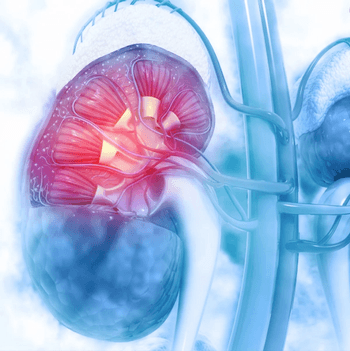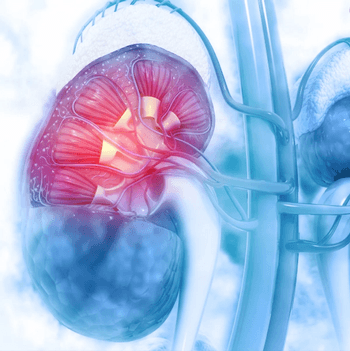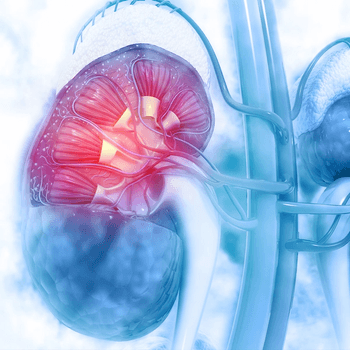
February 13, 2021 - Certain molecular signatures at baseline were found to be independently linked with long-term response to apalutamide in patients with nonmetastatic castration-resistant prostate cancer.

Your AI-Trained Oncology Knowledge Connection!


February 13, 2021 - Certain molecular signatures at baseline were found to be independently linked with long-term response to apalutamide in patients with nonmetastatic castration-resistant prostate cancer.

February 13, 2021 - Bacillus calmette-guérin plus N-803 demonstrated promising responses with a tolerable safety profile when used in patients with BCG-unresponsive, non–muscle-invasive bladder cancer carcinoma in situ

February 13, 2021 - Reductions in prostate-specific antigen screening are likely responsible for the recent increase in metastatic prostate cancer cases in the United States.

February 13, 2021 - 18F-DCFPyL, an investigational prostate-specific membrane antigen PET imaging agent, was found to detect and localize metastatic lesions with a high correct localization rate and positive predictive value.

Patrick Pilie, MD, discusses the impact of adiposity on response to androgen signaling inhibition in patients with metastatic castration-resistant prostate cancer.

Tanya Dorff, MD, discusses the effects of bright white light therapy on obese frailty in older men with prostate cancer.

February 13, 2021 - Enfortumab vedotin was found to have superior efficacy over chemotherapy when used in patients with advanced urothelial carcinoma who had received prior platinum-based chemotherapy and PD-1/L1 inhibition.

February 13, 2021 - Treatment with apalutamide plus androgen-deprivation therapy reduced the risk of death by 35% versus ADT alone in patients with metastatic castration-sensitive prostate cancer.

February 13, 2021 - Nivolumab following surgery extended disease-free survival compared with placebo for patients with muscle-invasive urothelial carcinoma.

February 12, 2021 - Enfortumab vedotin elicited the highest response rates observed for any regimen examined in cisplatin-ineligible patients with locally advanced or metastatic urothelial cancer who received prior PD-1/PD-L1 inhibitors.

February 12, 2021 - Cabozantinib demonstrated significant intracranial and extracranial responses in patients with metastatic renal cell carcinoma who have brain metastases.

Cristiane Bergerot PhD, MS, BS, discusses how a higher starting dose of lenvatinib, to be combined with everolimus, can improve health-related quality of life in patients with renal cell carcinoma, as demonstrated in a phase 2 open-label trial.

February 12, 2021 - The combination of nivolumab and cabozantinib continued to showcase a superior survival benefit over single-agent sunitinib when used as first-line treatment in patients with advanced renal cell carcinoma.

Eleni Efstathiou, MD, discusses the key findings of the placebo-controlled, double-blind phase 3 ACIS study of apalutamide and abiraterone acetate plus prednisone versus prednisone alone in patients with chemotherapy-naïve metastatic castration-resistant prostate cancer.

February 12, 2021 - Tivozanib led to a significantly greater quality-adjusted time without symptoms of disease and toxicity as third- or fourth-line therapy versus sorafenib in patients with metastatic renal cell carcinoma.

February 12, 2021 - Crossover from placebo to darolutamide appeared to have minimal impact on the overall survival benefit experienced by patients with nonmetastatic castration-resistant prostate cancer who were enrolled to the pivotal phase 3 ARAMIS trial.

February 12, 2021 - Atezolizumab monotherapy showed favorable outcomes compared with chemotherapy alone as frontline treatment for patients with cisplatin-ineligible IC2/3 advanced or metastatic urothelial carcinoma.

February 12, 2021 - The novel prostate specific membrane antigen–targeted radiopharmaceutical for PET imaging technique, 18F-DCFPyL, demonstrated potential in identifying occult prostate cancer and more accurately characterizing disease burden.

February 12, 2021 - The androgen receptor inhibitor darolutamide continues to show favorable tolerability in patients with nonmetastatic castration-resistant prostate cancer, even when given for a prolonged period of time.

February 12, 2021 - Patients with advanced renal cell carcinoma reported improved health-related quality of life when treated with nivolumab plus cabozantinib compared with sunitinib

February 12, 2021 - Ruxolitinib demonstrated a significantly higher overall response rate compared with best available therapy among adolescent and adult patients with chronic graft-versus-host disease.

February 11, 2021 - Eganelisib, a novel PI3K-y inhibitor, demonstrated higher responses rates with nivolumab in patients with metastatic urothelial carcinoma.

Tian Zhang, MD, discusses the goal of the ongoing PDIGREE trial examining nivolumab and ipilimumab plus cabozantinib in patients with metastatic untreated renal cell cancer.

February 11, 2021 - Adding apalutamide to abiraterone acetate and prednisone reduced the risk of radiographic progression or death by 30% in patients with chemotherapy-naïve metastatic castration-resistant prostate cancer receiving androgen deprivation therapy.

Scott R. Solomon, MD, discusses the effects of lisocabtagene maraleucel in patients with relapsed/refractory large B-cell non-Hodgkin lymphoma who were previously treated with CD19-directed therapies.

Rajneesh Nath, MD, discusses the interim results of the phase 3 SIERRA trial in patients with relapsed/refractory acute myeloid leukemia.

February 11, 2021 - Treatment with the first-generation precision cell therapy Orca-T led to a significant reduction in cases of graft-versus-host disease, an impressive GVHD relapse-free survival rate, a lack of treatment-related mortalities, while showcasing scalability potential.

February 11, 2021 - Avelumab as frontline maintenance therapy plus best supportive care showed a favorable benefit-risk balance in Japanese patients with advanced urothelial cancer that did not progress on first-line chemotherapy.

February 11, 2021 - The novel tubulin inhibitor VERU-111 demonstrated early antitumor activity and a well-tolerated safety profile in patients with metastatic castration-resistant prostate cancer who failed a prior androgen receptor–targeting agent.

February 11, 2021 - First-line treatment with immune checkpoint inhibitor–based regimens could be linked with an improvement in overall survival versus select targeted therapies in patients with metastatic non–clear cell renal cell carcinoma.